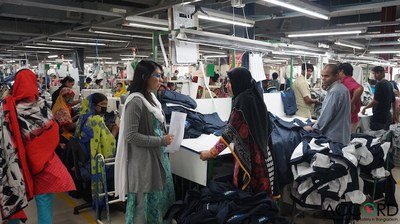
May 15 marks nine years since the signing of the Accord on Fire and Building Safety in Bangladesh. To date, the trailblazing, legally binding agreement has protected over two million garment workers by making sure 1,600 factories in Bangladesh meet safety requirements, but Levi’s and IKEA refuse to sign the now updated agreement.
The Accord was a response to the devastating Rana Plaza building collapse in Bangladesh, April 2013. In the collapse, 1,134 garment workers lost their lives due to incredibly unsafe factory conditions. Workers and advocacy groups, including MSN and the Clean Clothes Campaign, had been calling for improved safety measures for years, but it took this deadly collapse to finally get brands to come to the table and negotiate a legally binding agreement.
173 brands have now signed the updated agreement, the International Accord for Health and Safety in the Textile and Garment Industry – including fast fashion giants like H&M, Inditex (Zara), Fast Retailing (UNIQLO) and PVH (Tommy Hilfiger, Calvin Klein). This new version, which commenced in September 2021, allows for expansion to other countries that also have a history of violations. This new Accord can make workplaces safe for workers in the global garment and textile supply chain by establishing independent inspections, remediation, a complaint mechanism, and safety committees in factories that supply to international brands.
Despite the unquestionable need to better protect workers, some notable brands that source from Bangladesh have not yet signed the Accord. Brands like Levi’s and IKEA pride themselves on sustainability and workers’ rights, but have refused to sign the accord so far, risking the safety of workers in their supplier factories.
“If Levi’s and IKEA were as committed to sustainability and wellbeing as they claim, their names would be on the Accord. Every day that Levi’s and IKEA refuse to sign the Accord, they put their own workers' lives on the line. It’s time that brands, particularly those who brand themselves as ‘sustainable’ and focused on ‘worker-wellbeing,’ take committed steps to achieve those goals by signing the only legally binding agreement, the Accord.” - Ineke Zeldenrust of Clean Clothes Campaign.
Levi’s and IKEA cite their own safety programs as a reason for not signing the Accord, yet these programs serve as little more than PR for consumers. A Clean Clothes Campaign report released last month showed both Levi’s and IKEA’s human rights, environmental protection and worker health and safety schemes were woefully underperforming. Neither met the safety standards of the International Accord.
“By refusing to sign the Accord, brands like Levi’s and IKEA are putting their own profit over the lives and safety of people who work tirelessly for them. It’s time for all brands who operate in Bangladesh to sign the accord and for those that refuse, to be publicly shamed.” - Amirul Haque Amin, President of the National Garment Workers Federation in Bangladesh.
In 2022, the Accord Steering Committee will expand the International Accord to another country. The Committee is currently selecting which country they will expand to next.
“Garment workers, regardless of where they are in the world, deserve to feel safe when they go to work. Workers in Sri Lanka want to have the ability to hold brands accountable for their own safety, as they have been able to in Bangladesh.” - Anton Marcus, Joint Secretary of the Free Trade Zones and General Services Employees Union, Sri Lanka
“10 years ago, Pakistan lost over 250 lives in the Ali Enterprises factory fire. We still have no legally binding agreement that forces brands to take action in favour of workers' safety and prevent something horrific like this from happening again. The Pakistani garment and textile sector is in need of an Accord like the one in Bangladesh, where brands can be forced to come to the table and listen to the needs of the workers they employ.” - Karamat Ali, Executive Director of The Pakistan Institute of Labour Education & Research (PILER).
For more information:
- A full list of which brands did and did not sign the Accord.
- FAQ with more information on the Accord.
- Background on Bangladesh Fire and Building Safety